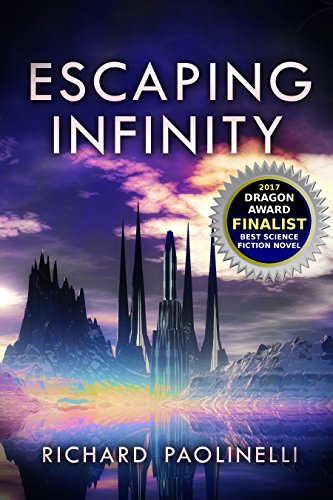I’ve wanted to read and review one of Richard Paolinelli’s novels for quite some time now, since I previously reviewed his short story The Last Hunt which was featured in last year’s Superversive Press anthology To Be Men: Stories Celebrating Masculinity. I finally got my opportunity with Escaping Infinity, a 2017 Dragon Award Finalist.
As I got into Paolinelli’s book, I found it had some similarities to Australian SciFi writer Matt Reilly’s 2000 novel Contest. In both books, an innocent couple is thrown into a highly unlikely environment where they must solve a series of challenges in order to survive. In Reilly’s case, it was the location was the main branch of the New York City Public Library, and in Paolinelli’s novel, it’s a seemingly five-star hotel located in the middle of the Arizona desert, miles away from where any such structure has a right to be.
Peter and his friend and co-worker Charlie are driving to Phoenix for a business trip and become lost. Running out of gas and miles from nowhere, they come across an incredibly futuristic and opulent hotel called “Infinity.” Once inside, they realize the hotel and casino can provide a virtually unlimited supply of pleasures and experiences, enough to keep them there for a lifetime, which seems to be the idea.
Quickly, Peter realizes that not only has Charlie fallen under the Infinity’s spell, but so have the rest of the guests, who seem to come, not only from every country and culture on Earth, but from across time, reaching all the way back to ancient Egypt. Surprisingly, no one seems to be aware of this, and each of them are seeing a different version of “Infinity.”
Peter discovers that besides the mysterious hotel manager, the only other person with this awareness is Liz, who is one of the hotel’s employees. Only later does he find out, she is actually a woman who has been in the Infinity since the mid 1850s, stranded there as the only survivor of a doomed wagon train that was decimated in southern Utah.
Peter and Liz attempt to avoid the manager’s attention while they seek a way out of the hotel’s environment, which has no windows or doors leading to the outside. However, without them realizing it, this is exactly what the manager wants, because only if Peter proves himself can the inhabitants of Infinity, including the manager, be able to finally get free.
Peter and Liz manage to eventually succeed with the result of the Infinity vanishing, depositing thousands of people near a bay, but are they still on Earth?
The manager reveals himself to be the former commander of a fleet of interstellar spacecraft who had inadvertently destroyed all life on Earth at some point in the future past Peter’s lifetime. As a way to compensate, the aliens use highly advanced technology to restore Earth’s biosphere, but it’s the commander alone who uses time travel tech to create the Infinity, a structure that exists all at once across Earth’s past timeline and in multiple geographic locations for the purpose of collecting human beings, animals and plants, and transporting them to the far future, the reconstructed “New Earth.”
If the book had stopped here, it would have been just fine, but it goes on.
There’s no real explanation as to why Peter (or someone) must solve the puzzle of Infinity that is kept in the manager’s office, except that once Peter does, he is gifted with godlike powers to alter matter at the atomic level, enabling him to reshape anything on the rebuilt Earth. After this, Paolinelli takes the reader on a relatively quick leap forward in human history (people now being all but immortal), lightly skipping over a ton of details, first to colonize the solar system, and then to visit their benefactor’s planet.
The manager has died thousands of years previously, but Peter’s unique abilities allow him to resurrect the alien and ultimately take him with their crew aboard their starship Infinity to explore the Andromeda galaxy (as if the Milky Way and its companion galaxies weren’t enough of a challenge).
The book could have used a much tighter focus, more attention to detail, and some better explanation as to why only certain people were able to understand the secret of the hotel. Also, no matter what tricks you play, I can’t imagine that an ancient Egyptian could ride with a 21st century American on a high-speed elevator controlled by electronic key cards. Sure, the Egyptian would be seeing their environment as consistent with what they’re used to, but how would these two people be able to reconcile their experiences together.
Unfortunately, there are any number of similar plot holes that present themselves throughout the novel, and the narrative descended into expositional description at several points, rather than letting the characters tell and show their own stories.
It was an interesting puzzle up until the solution that deposits the survivors on future Earth, but after the climax, the rest was really unnecessary, or Paolinelli could have saved it for a sequel, inserting sufficient challenges for Peter and company who, after having become the new supernatural savior of mankind, seemed capable of anything, making any problem they encountered far too easy to solve, and thus depriving the latter portion of his book of any drama.


Thanks for reading and reviewing it! May I post a link to this review on my social media?
LikeLike
Sure you can. Thanks.
LikeLiked by 1 person